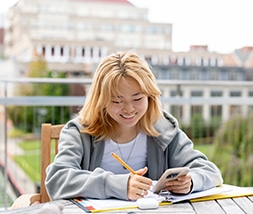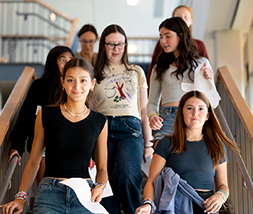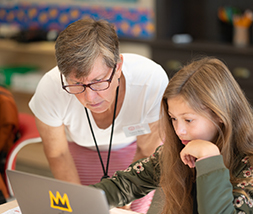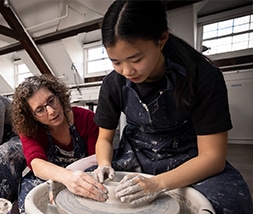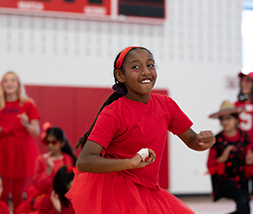Curriculum Guide
World Languages
French
Class I French
Who am I as a learner? And who do I want to be? What does learning French look like and feel like? Learning in French I is guided by the exploration of these questions. As we work on listening, speaking, reading, and writing skills, students develop the dispositions required of effective learners, including tenacity, resilience, receptivity to feedback, and careful observation skills. Students will explore the fundamentals of grammar and syntax: number (singular/plural), gender, verb conjugation, spelling, and pronunciation conventions, all within a communicative context. As students learn to describe themselves, their peers, and the broader world in French, they will actively contribute to building their understanding of the French language. Students will also engage with music by French-speaking artists from around the world, exploring Francophone geography, traditions, and cultures. Emphasizing creativity, communication, collaboration, and cultural awareness, the French I curriculum encourages students to approach language learning joyfully from many angles and to discover which strategies and tools are best for them as language learners and French speakers along the way.
Class II French
How do careful observation and listening contribute to problem-solving? How are problem-solving and language-learning connected? What can I learn from making a map of a city? What can a map tell us about a city’s inhabitants? What do I learn about my classmates from the maps they create? Students in French II will engage with these essential questions throughout the year as they practice listening, speaking, reading, and writing, and develop their cultural competency skills. In a joyful, vibrant, and creative setting, students perform skits, sing, and create works of art as they acquire the basics of the French language and develop the dispositions of effective, independent learners. Students begin the year in French II creating a map of a French-speaking city and considering what aspects of a city’s structure are necessary for a culture to flourish. This consideration of city life will continue in the second semester when students pursue a research project on a city from the Francophone world. Throughout the year, students will continue to develop their mastery of the fundamentals of grammar and syntax and add to their vocabulary base. They will learn to express preferences and describe their family, school, the arts and the world around them. As they do so, students will actively contribute to building the content and driving the curriculum of this course and will be encouraged to take charge of their learning, give themselves feedback, and develop personal strategies to achieve confidence and excellence as French speakers.
Class III French
How do the patterns I observe in the language lead to understanding? Where is French spoken in the world? What does it mean to be a French speaker? What does it mean to me to be learning French? In French III, students will actively engage with these questions while strengthening their listening, speaking, reading, writing, and cultural competency. Students will continue to hone their critical thinking skills related to language learning, and will be encouraged to actively reflect on who they are as learners and how they learn best. In French III, students will develop their research skills as they explore the wide range of cultures in the Francophone world. They will encounter new nuances of the language as they expand their vocabulary base and discover new verb families, and will be able to describe future events, form questions, and develop richer and more complex sentences. Using culturally authentic sources, students will learn to negotiate travel plans and consider differences and similarities in food culture. Students will also develop and extend their reading comprehension skills and speaking ability by engaging with a short novel set in Marseille. Classes are conducted in such a way that French speaking practice is maximized through pair work, skits, conversations and presentations.
Class IV French
What do I learn about myself and my own culture by engaging with other cultures? How does what I am learning in French class connect to who I am in the world? How can I be a more independent learner? These questions will serve as touchstones for our class throughout the year as students continue to develop their listening, speaking, reading, writing skills, as well as their cultural competency. Building on previous years, French IV emphasizes critical thinking skills related to language acquisition, and students actively reflect on how they learn as well as what they are learning. Linguistically, students will review, refine, and build upon their foundation of grammar and vocabulary, and they will acquire new structures, such as the passé composé, that will expand their ability to express their thoughts in French. They will further develop their reading comprehension skills and practice critical analysis in French as they read and discuss works of short fiction. They will engage in more complex writing assignments, including short essays and creative writing. Students will continue with their exploration of the Francophone world as they delve into the study of the province of Québec.
LATIN
Class I Latin
Who am I as a learner? And who do I want to be? What does learning Latin look, sound, and feel like? During this course, students will unpack the answers to these questions as they discover the Latin language and various aspects of Roman culture through stories in the format of a graphic novel about the daily lives and adventures of Roman families living in the town of Herculaneum in the first century C.E. They acquire a sufficient knowledge of Latin grammar and vocabulary to be able to carry on a Latin conversation and read and write simple stories in Latin. They enrich their English vocabulary by making connections between English words and their Latin roots, thereby deepening their understanding of the English language. They also explore the archaeological finds that have contributed to our knowledge of Roman life. Latin students will work with their peers in other languages to research, experience, and make connections between the cuisine of ancient and modern societies. With the help of the stories on Greek and Roman mythology included in each chapter of the textbook, students encounter aspects and perspectives of Roman culture that inform both ancient and modern literature.
Class II Latin
What was life like for someone like me in ancient Rome? If I lived then, how would my experience be different? The same? What does learning Latin tell me about myself as a learner? How does careful observation and listening lead to problem-solving? Thinking about aspects of Roman life learned in the previous year and what they imagine about Roman daily life, students begin to explore the Latin language through the eyes of various people living during the Roman Empire, as told in the Suburani series. They will expand their knowledge of Latin grammar as they encounter the present tense, infinitive expressions, as well as uses of the nominative, accusative, and ablative cases. Students will explore mythology and history and examine the beliefs of ancient Romans. The study of Latin in Class II perfectly complements the exploration of Ancient Greece and Rome in history classes, enabling students to make deeper connections as they prepare for the Greek symposium. In addition, Latin students will join their classmates studying modern languages to complete a project about an ancient city. Students grow in their appreciation of the echoes of Roman architecture and engineering that are still evident in the world today.
Class III Latin
How do the patterns I observe in the language lead to understanding? What do the everyday practices of the ancient Romans teach me about their beliefs and priorities? How can archeological discoveries teach me about people’s lives and the history of their culture? The course is based on a reading approach to language learning using the Suburani textbook series. In this immersion method, students learn grammar and vocabulary by reading passages in Latin and develop their ability to use deductive logic. As students learn how Latin works as a language, they draw comparisons between Latin and English and other languages they may know. They also make vocabulary connections and learn to use their knowledge of Latin words to decode the meaning of unfamiliar words in English. A varied range of class activities and projects serves to accommodate the learning styles of all students. The class does a research project focusing on the archeological evidence for everyday cultural practices, as well as smaller projects relating to artistic expressions of Roman mythology and culture. Reading skills are reinforced orally through the creation of descriptions, dialogues and skits. Through the study of language, history, mythology, art, architecture, and geography, students discover the multifaceted aspects of Roman civilization and the influence of ancient Rome on modern culture.
Class IV Latin
Whose voices are centered in the stories we read about ancient Roman culture? How does this impact my thinking about whose voices are centered in my own culture? How can I be a more independent learner? Students explore the answers to these questions as they continue their study of Latin using the reading approach of the Suburani textbook series. As they encounter passages of increasing difficulty, students will continue to hone their deductive logic in order to gain mastery of Latin grammar and vocabulary. Students will not only grapple with the intricacies of Latin grammar, but will also delve deeper in their historical and cultural understanding of the Greco-Roman world. To accommodate the learning styles of all students, the course reinforces reading skills orally and includes various creative activities and projects. Students will take the National Latin Exam in March and then finish the year with an in-depth study of mythology. They will engage with multiple ancient sources and create an interpretation that re-imagines a story from a new perspective. Students will complete the year not only ready to face the challenges of a Latin 2 class, but also equipped with a thorough understanding of an ancient world so closely linked with the world we live in today.
MANDARIN CHINESE
Class I Mandarin Chinese
Where is Mandarin Chinese spoken? How does Mandarin differ from Cantonese? What is Simplified Chinese and how is it different from Traditional Chinese? Who am I as a learner? What does learning Chinese look like and feel like? Class I language emphasizes critical thinking skills related to language acquisition and encourages students to develop a productive and proactive “language acquisition stance.” Students will consciously develop and strengthen specific skills, and they will always be required to explain what they know and how they acquired that knowledge. Class I Mandarin students will begin to acquire the phonetic spelling system Pinyin with tones, and the building blocks of Chinese characters through drawing and acting. This course also serves as an introduction to the geography of the Chinese-speaking world. Students will consider questions such as: Who speaks Chinese? What are the cultures of these places like? Students will explore various aspects of China’s cultures and history through stories of traditional Chinese holidays, nursery rhymes, authentic children’s games in China, and videos on Chinese culture and history. Students will develop the skills and dispositions needed to guide their own learning, with the class structured to provide the support and scaffolding needed by the individual learner to achieve goals in learning Chinese. By the end of the year, students will be able to communicate effectively in Mandarin in common daily conversations and acquire a solid fundamental understanding of the Chinese language, culture, and history.
Class II Mandarin Chinese
What is Pinyin and how is it similar and different from English phonics? What are the formations of Chinese characters? What are radicals and why are they important in learning Chinese characters? What do I learn from making the map of a community? What do I learn about the other map-makers from the maps they have created? How does careful observation and listening lead to problem-solving? What kind of patterns do I observe from the vocabularies from the same category? How are my observations going to help me advance my learning of the Chinese language? In Class II Mandarin, students will continue to develop their critical thinking skills and practice using various thinking routines to acquire new materials. Students will develop five skill sets related to language acquisition: listening, speaking, reading, writing, and cultural competency. Pinyin—the Mandarin phonetic system—will be emphasized, with an introduction to typing Chinese characters using Pinyin. At the same time, students will learn to write some of the most commonly used Chinese characters, from stroke to stroke orders, radicals, and the formation of the Chinese characters. Mini research on Chinese cultural topics will include hands-on experience with calligraphy, paper cutting, and lantern and mooncake making. This course will use the computer as a tool to enhance student’s learning outside of class through various online educational games. Students will develop the skills and dispositions needed to guide their own learning, with the class structured to provide the support and scaffolding needed by the individual learner to achieve goals. By the end of the year, students will be able to conduct various simple conversations in Mandarin Chinese, and describe their daily activities in a short paragraph.
Class III Mandarin Chinese
How do the patterns I observe in the Chinese language lead to understanding? Where is Chinese spoken in the world and how does that contribute to loan words in the Chinese language and the English language? What does it mean to be a Chinese speaker? What does it mean for me to be learning Chinese? How will I use what I learned thus far in daily life? Class III Mandarin will continue introducing students to the official Chinese language (Pǔtōnghuà), the writing system in Simplified Chinese Characters, and the Chinese culture in daily interactions such as shopping and dining. Students will start with a review of pronunciation rules and gradually move up to building the vocabulary foundation needed for more advanced daily conversations related to one’s daily life as a student, such as describing the weather, bargaining for a better price, ordering food and drinks, and describing symptoms at the doctor’s office. Students will be asked to continue to discover patterns they see in Chinese to help them learn the language more efficiently. At the end of each unit, students are encouraged to use what they have learned throughout these years to create meaningful skits and short stories to demonstrate their mastery of their Chinese skills. Students will connect and compare Chinese culture and their home culture by viewing educational videos exploring various cultural topics. This class will help students develop a productive and proactive approach that works for them as students of language. By the end of the year, students will be able to conduct various conversations in Mandarin Chinese, and describe their student life in multiple paragraphs.
Class IV Mandarin Chinese
What strategies have I developed that help me learn? How does understanding the Chinese immigrant experience deepen my understanding of my home country and heritage? How did historical events such as World Wars and domestic wars lead to human diasporas and the development of the world as we see today? How does what I am learning in Chinese class connect to who I am in the world? This course will support students as they assimilate more complex grammar and vocabulary and challenge themselves to think in Chinese. Students will acquire new expressions needed for asking and answering questions about one’s past experiences and future plans. The course will provide students with feedback on their Mandarin speaking, listening, reading, and writing performance as well as their learning process and strategies. Students will learn to look for patterns in their own work and make use of those observations by way of reflection that helps them design and prioritize learning goals. Students will also encounter Chinese culture through historical events happening in the U.S. and around the world, which will deepen their understanding of the Chinese diaspora and the cultural influences that the Chinese have brought to the places they have settled. Students will uncover hidden connections between the Chinese language and its many forms, learning about how Chinese identities looked in different times and places. By the end of the year, students will be able to conduct more in-depth conversations in Mandarin Chinese, and describe their past and future plans in a cohesive essay.
SPANISH
Class I Spanish
Who am I as a learner? And who do I want to be? What does it mean to me to be excellent? What will I do to achieve excellence? Exploration of these questions guides student learning in Spanish. While working on listening, speaking, reading, and writing skills, students also develop the dispositions required of effective learners, including tenacity, resilience, receptivity to feedback, and careful observation skills, among others. Focusing on describing themselves, their peers, and the wider world in Spanish, students actively contribute to building the content and driving the curriculum of this course. Students will learn language structures in the present tense and practice conversational questions to engage with their peers in short dialogues. Emphasizing creativity, spontaneity, and the arts, students approach language learning from many angles, discovering which strategies and tools are best for them along the way.
Class II Spanish
What do I learn from making the map? What do I learn from the maps that others have created? How does careful observation and listening lead to problem-solving? These essential questions guide student learning throughout the year as they practice listening, speaking, reading, writing, and cultural competency skills and develop the dispositions of an effective, independent learner. Focusing on expressing preferences, negotiating life in a community, and describing the world around them in Spanish, students actively contribute to building the content and driving the curriculum of this course. In a joyful, vibrant, and creative setting, students perform skits, sing, and create works of art as they acquire the basics of the Spanish language. As they grow as Spanish speakers, students are always encouraged to take charge of their learning, give themselves feedback, and develop personal strategies to achieve excellence.
Class III Spanish
What is the pattern? What does it tell me? How will I use it? What does carefully engaging with the arts teach me about myself and the world? These questions serve as the throughlines for Spanish III. All year, students work to develop listening, speaking, reading, writing, and cultural competency skills to reach the communicative benchmarks of this course. Using many traditional art forms, including Afro-Caribbean drumming and traditional folk music, students explore their relationships to communities, local and global. With a strong emphasis on using Spanish in class, students express complex ideas and questions, taking risks with the language to solidify their learning. For example, students research health challenges faced by Boston-area Latinx communities and use Design Thinking strategies to create authentic wellness posters that are displayed throughout the city. As in previous years, this course emphasizes critical thinking skills related to language learning, encouraging students to actively reflect on how they learn. Using a wide range of classroom routines, students develop a solid grammar and vocabulary foundation to engage in dialogues about going camping with friends, discussing a doctor’s visit, or describing their wellness routines. As students develop the skills and dispositions needed to guide their own learning, classes are structured to provide support and scaffolding for the individual learner.
Class IV Spanish
What do I learn about myself and my community by taking a stand? How does understanding the immigrant experience deepen my understanding of my country? How can I be a more independent learner? These questions will serve as touchstones throughout the year as students develop the skill sets, listening, speaking, reading, writing, and cultural competency that are necessary to reach the communicative benchmarks of this course. In the content-rich, culturally appropriate context provided in class, students learn to discuss social issues that interest them as well as take political action; they deepen their understanding of the language by exploring the journeys of immigrant families in the US and the complex narratives around immigration in this country. Building on previous years, the course continues to emphasize critical thinking skills related to language acquisition and encourages students to actively reflect on how they learn as well as what they are learning. With a strong emphasis on using Spanish in class, students express complex ideas and questions, taking risks with the language to solidify their learning. Readings, videos, games and skits are part of this dynamic and diverse curriculum, where students develop the skills and dispositions needed to guide their learning. Classes are structured to provide the support and scaffolding the individual learner needs to grow as a Spanish speaker and achieve the goals they set for themselves within the context of the existing curriculum.
